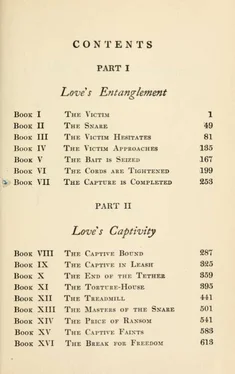Upton Sinclair - Love's pilgrimage
Здесь есть возможность читать онлайн «Upton Sinclair - Love's pilgrimage» весь текст электронной книги совершенно бесплатно (целиком полную версию без сокращений). В некоторых случаях можно слушать аудио, скачать через торрент в формате fb2 и присутствует краткое содержание. Год выпуска: 1911, Издательство: New York : M. Kennerley, Жанр: Старинная литература, на английском языке. Описание произведения, (предисловие) а так же отзывы посетителей доступны на портале библиотеки ЛибКат.
- Название:Love's pilgrimage
- Автор:
- Издательство:New York : M. Kennerley
- Жанр:
- Год:1911
- ISBN:нет данных
- Рейтинг книги:4 / 5. Голосов: 1
-
Избранное:Добавить в избранное
- Отзывы:
-
Ваша оценка:
- 80
- 1
- 2
- 3
- 4
- 5
Love's pilgrimage: краткое содержание, описание и аннотация
Предлагаем к чтению аннотацию, описание, краткое содержание или предисловие (зависит от того, что написал сам автор книги «Love's pilgrimage»). Если вы не нашли необходимую информацию о книге — напишите в комментариях, мы постараемся отыскать её.
Love's pilgrimage — читать онлайн бесплатно полную книгу (весь текст) целиком
Ниже представлен текст книги, разбитый по страницам. Система сохранения места последней прочитанной страницы, позволяет с удобством читать онлайн бесплатно книгу «Love's pilgrimage», без необходимости каждый раз заново искать на чём Вы остановились. Поставьте закладку, и сможете в любой момент перейти на страницу, на которой закончили чтение.
Интервал:
Закладка:
Some one whom I could court
With no great change of manner,
Still holding reason's fort,
While waving fancy's banner!"
All of which things made a subtle change in his attitude to Corydon, whom he still met occasionally. Cory-don was now a young lady, beautiful, even stately, with an indescribable atmosphere of gentleness and purity about her. All things unclean shrunk from her. presence; and so in times of distress he liked to be with her. He would drop vague hints as to sufferings and temptations, and told her that she seemed like a "goddess" to him.
Corydon received this with some awe, but with more perplexity. She could not understand why anyone should struggle so much, or why a youth should take such a sombre view of things. But she was perfectly willing to seem like a "goddess" to anyone, and she was glad if that helped him. She was touched when he read her a poem of his own, a poem which he held very precious. He called it
'A song of the young-eyed Cherubim In the days of the making of man.'
And in it he had set forth the view of life that had come to him—
it.
The quest of the spirit's gain— Lured by the graces of pleasure,
And lashed by the furies of pain.
Thy weakness shall sigh for an Eden,
But the sword shall flame at the gate; For far is the home of thy vision
And strong is the hand of thy fate!"
§ 13. THOUGH Thyrsis had no time to realize it, it was in this long and bitter struggle that he won whatever power he had in his future life. It was here that he learned "to hold his will above him as his law", and to defy the world for the sake of his ideal. And then, too, this toil was the key that opened to him the treasure-house of a new art—which was music.
Until he was nearly * out of college Thyrsis had .scarcely heard any music at all. Church-hymns he had learned, and a few songs in school. But now in poetry and other books he met with references to composers, and to the meaning of great music; and the things that were described there were the things he loved, and he began to feel a great eagerness to get at them. As a first step he bought a mandolin, and set to work to teach himself to play, a task at which he wrought with great diligence. At the same time a friend had bought a guitar, and the two set to work to play duets. The first preliminary was the getting of the instruments in tune; and not knowing that the mandolin is an octave higher than the guitar, they spent a great deal of time and broke a great many guitar-strings.
As the next step, Thyrsis went to hear a great pianist, and sat perplexed and wondering. There was a girl next to him who sobbed, and Thyrsis watched her as he might have watched a house on fire. Only once the pianist pleased him —when he played a pretty little piece called somebody's "impromptu", in which he got a gleam of a "tune." Poor Thyrsis went and got that piece, and took it home to study it, with the help of the mandolin; but, alas, in the maze of notes he could not even find the "tune."
But if he could not understand the music, he could
read books about it; he read a whole library—criticism of music, analysis of music, histories of music, composers of music; and so gradually he learned the difference between a sarabande and a symphony, and began to get some idea of what he went out for to hear. At first, at the concerts, all he could think of was to crane his neck and recognize the different instruments; he heard whole symphonies, while doing nothing but watching for the "movements," and making sure he hadn't, skipped any. One heartless composer ran two movements into one, and so Thyrsis' concert came out one piece short at the end, and he sat gazing about him in consternation when the audience rose to go. Afterwards he read long dissertations about each symphony before he went, and he would note down the important points and watch for them. The critic would expatiate upon "the long-drawn dissonance forte, that marks the close of the working-out portion"; and Thyrsis would watch for that long-drawn dissonance, and be wondering if it was never coming—when suddenly the whole symphony would come to an end! Or he would read about a "quaint capering measure led off by the bassoons," or a "frantic sweep of the violins over a trombone melody," and he would watch for these events with eyes and ears alert, and if he found them— eureka!
But such things could not last forever; for Thyrsis had a heart full of eagerness and love, and of such is the soul of music. And just then was a time when he was sick and worn—when it seemed to him that the burden of his life was more than he could bear. He was haunted by the thought that he would lose his long battle, that he would go under and go down; and then it was that chance took him to a concert which closed with the great "C-Minor Symphony."
Thyrsis had read a life of Beethoven, and he knew that here was one of the hero-souls—a man who had grappled with the fiends, and passed through the valley of death. And now he read accounts of this titan symphony, and learned that it was a battle of the human spirit with despair. He read Beethoven's words about the opening theme—"So knocks fate upon the door!" And a fierce and overwhelming longing possessed him to get at the soul of that symphony.
He went to the concert, and heard nothing of the rest of the music, but sat like a man in a dream; and when the time came for the symphony, he was trembling with excitement. There was a long silence; and then suddenlv came the first theme—those fearful hammer-
•/
strokes that cannot be thought without a shudder. They beat upon Thyrsis' very heart-strings, and he sat appalled; and straight out he went upon the tide of that mighty music-passion—without knowing it, without knowing how. He forgot that he was trying to understand a symphony; he forgot where he was, and what he was; he only knew that gigantic phantoms surged within him, that his soul was a hundred times itself. He never guessed that an orchestra was playing a second theme; he only knew that he saw a light gleam out of the storm, that he heard a voice, pitiful, fearful, beautiful beyond utterance, crying out to the furies for mercy; and that then the storm closed over it with a roar. Again and again it rose; Thyrsis did not know that this was the "working-out portion" that had forever been his bane. He only knew that it struggled and fought his fight, that it pleaded and sobbed, and rose higher and higher, and began to rejoice— and that then, came the great black phantom-shape sweeping over it; and the iron hammer-strokes of Fate
beat down upon it, crushed it and trampled it into annihilation. Again and again this happened, while Thyrsis sat clutching the seat, and shaking with wonder and excitement. Never in his experience had there been anything so vast, so awful; "t was more than he could bear, and when the first movement came to an end— when the soul's last hope was dead—he got up and rushed out. People who passed him on the streets must have thought that he was crazy; and afterwards, that day and forever, he lived all his soul's life in music.
As a result of this Thyrsis paid all his bank-account for a violin, and went to see a teacher.
"You are too old," the teacher said.
But Thyrsis answered, "I will work as no one ever worked before."
"We all do that," replied the other, with a smile. And so they began.
And so all day long, with fingers raw, and arms and back shuddering with exhaustion, Thyrsis sat and practiced, the spirit of Music beckoning him on. It was in a boarding-house, and there was a nervous old man in the next room, and in the end Thyrsis had to move. By the time he went away to the country, he was able to play a melody in tune; and then he would take some one that had fascinated him, and practice it and practice it night and day. He would take his fiddle every morning at eight and stride out into the forest, and there he would stay all day with the squirrels. They told him once how a new arrival, driving over in the hotel 'bus at early dawn, had passed an old Italian woman toiling up a hill and singing for dear life the "Tannhauser March." It chanced that the new arrival was a musician, and he leaned out and asked
Читать дальшеИнтервал:
Закладка:
Похожие книги на «Love's pilgrimage»
Представляем Вашему вниманию похожие книги на «Love's pilgrimage» списком для выбора. Мы отобрали схожую по названию и смыслу литературу в надежде предоставить читателям больше вариантов отыскать новые, интересные, ещё непрочитанные произведения.
Обсуждение, отзывы о книге «Love's pilgrimage» и просто собственные мнения читателей. Оставьте ваши комментарии, напишите, что Вы думаете о произведении, его смысле или главных героях. Укажите что конкретно понравилось, а что нет, и почему Вы так считаете.












